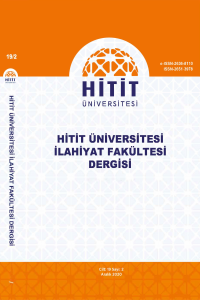Experience Architecture in Disaster Times, Meaning-Crisis, and Explanation of Suffering with Religious References
Öz
Peter L. Berger and Thomas Luckmann specifically place the issue of meaning, which is the crossroads of the sociology of religion and sociology of knowledge, at the center of their theories. Both the efforts to understand today's epidemic experience and the explanation suggestion of approaches of the theorists in understanding these efforts in sociology shape the problem of this study. Thus, in this study, the issue of meaning in times of crisis has been problematized to test the assertion that "human life does not produce meaning based on events that are only sources of happiness, and marginal experiences are also sources of meaning". According to Berger and Luckmann, the main function of religion is to make sense of the experiences of daily life. Focusing on the notion of order as well as threats to it, this attempt to make sense is collective, not individual; the product it produces is “thin and fragile” and therefore “must be rebuilt continuously. Berger focuses on the function of religion in the context of legitimizing suffering, and according to him, “religion does what a worldview does; justifying the shocking experiences.” Luckmann, on the other hand, focuses on the concept of world view in internalizing the meaning world of the given society and explaining its experiences with it.
Since there is no religious institutional monopoly in modern societies, the individuals have to make their own choice of meaning in pluralism. The meaning crisis, which is especially on the agenda in major events, especially in the current epidemic experience, has a distinctive form for the religious field. The way people make sense of their marginal experiences is shaped by reference to a community of meanings. The existence of a purely individual meaning-world is being questioned. The link between the crisis of meaning and theodicy, the search for an explanation that will be the source of the power to endure the suffering of everyday life, and the demands for its enabler nature are remarkable. The interpretations that define today's society as a risk society also define a ground for understanding the issue of theodicy through the risk argument. A meaningful world means a home for Berger; meaningful, orderly, and safe. “The history of humanity is a history of suffering,” says Berger, pointing to the power of nature's suffering, including the epidemic, to shape the story, as it is today. In the final analysis, as seen in Berger and Luckmann's theories, the current COVID-19 outbreak represents an experience in which people seek an explanation and want to make sense of it; this endless effort seems indispensable in the context of the human feeling at home.
Anahtar Kelimeler
Sociology of Religion Marginal Experiences Meaning-Crisis COVID-19 Sacred Canopy
Kaynakça
- Berger, Peter L. Kutsal Şemsiye: Dinin Sosyolojik Teorisinin Ana Unsurları. çev. Ali Coşkun. İstanbul: Rağbet Yayınları, 4. Basım, 2011.
Öz
Peter L. Berger ve Thomas Luckmann, din sosyolojisi ile bilgi sosyolojisinin etkileşime girdiği kavşak olan anlam meselesine kuramlarının merkezinde özellikle yer vermektedirler. Hem günümüz salgın deneyiminin anlaşılmasına yönelik çabalar hem de bu çabaların sosyolojide anlaşılmasında söz konusu kuramcıların yaklaşımlarının izah önerisi bu çalışmanın problematiğini şekillendirmektedir. Böylece bu çalışmada kriz dönemlerinde anlam meselesi, "insan hayatı salt mutluluk kaynağı olan olaylara dayanılarak anlam üretmez, marjinal deneyimler de anlam kaynağıdır" iddiasını sınamak için sorunsallaştırılmıştır. Berger ve Luckmann'a göre dinin temel fonksiyonu, gündelik hayatın deneyimlerini anlamlandırmasıdır. Düzen nosyonunun yanı sıra ona yönelik tehditlere de odaklanan bu anlam verme çabası bireysel değil kolektiftir; ortaya koyduğu ürün, “cılız ve kırılgandır” ve bu nedenle “sürekli olarak yeniden inşa edilmelidir. Berger, ıstırapları meşrulaştırılması bağlamında dinin işlevine odaklanır ve ona göre “din, bir dünya görüşünün yaptığını yapar; sarsıcı deneyimlerin haklı gösterilmesi. Luckmann ise dünya görüşü kavramıyla insanın verili toplumun anlam dünyasını içselleştirmesi ve onunla deneyimlerini izah etmesine odaklanır.
Modern toplumlarda dinî kurumsal tekel söz konusu olmadığı için çoğulculuk içinde bireyin kendi anlamlandırma tercihini yapması gereği söz konusudur. Günümüz salgın deneyimi başta olmak üzere majör olaylarda özellikle gündeme gelen anlam krizi, dinî alan için belirgin bir form taşır. İnsanın marjinal deneyimlerini anlamlandırması, bir anlam topluluğuna referansla şekillenir. Salt bireysel bir anlam dünyasının varlığı ise sorgulanmaktadır. Anlam krizi ve teodise arasındaki bağ, gündelik yaşamın ıstıraplarına dayanma gücünün kaynağı olacak bir açıklama arayışı ve onun muktedir kılan niteliğine yönelik talepkârlık dikkat çekicidir. Günümüz toplumunu risk üzerinden tanımlayan yorumlar aynı zamanda risk argümanı üzerinden teodise meselesinin anlaşılmasında da bir zemin tanımlamıştır. Anlamlandırılmış bir dünya Berger için bir ev anlamına gelir; anlamlı, düzenli ve güvenli. “İnsanlık tarihi, bir ıstırap tarihidir” diyen Berger, günümüzde yaşandığı gibi salgın dâhil doğadan kaynaklanan acıların öyküyü biçimlendirme gücüne işaret eder. Son tahlilde, Berger ve Luckmann'ın kuramlarında görüldüğü gibi, günümüz COVID-19 salgını da insanın bir açıklama aradığı ve anlamlandırmak istediği bir deneyimi temsil etmektedir; bu bitimsiz çaba, insanın kendini evinde hissetmesi bağlamında vazgeçilmez görünmektedir.
Anahtar Kelimeler
Din sosyolojisi Marjinal Deneyimler Anlam Krizi COVID-19 Kutsal Kubbe
Kaynakça
- Berger, Peter L. Kutsal Şemsiye: Dinin Sosyolojik Teorisinin Ana Unsurları. çev. Ali Coşkun. İstanbul: Rağbet Yayınları, 4. Basım, 2011.
Ayrıntılar
| Birincil Dil | Türkçe |
|---|---|
| Bölüm | Makaleler |
| Yazarlar | |
| Yayımlanma Tarihi | 30 Aralık 2020 |
| Yayımlandığı Sayı | Yıl 2020 Cilt: 19 Sayı: 2 |

Hitit Üniversitesi Kuzey Kampüsü Çevre Yolu Bulvarı 19030 - ÇORUM-TÜRKİYE
00 (90) 364 219 1100 - ilafdergi@hitit.edu.tr


